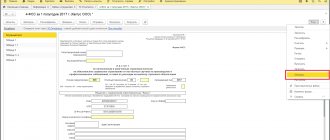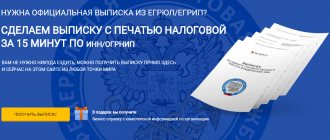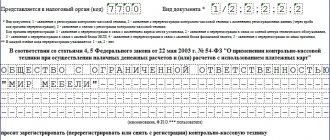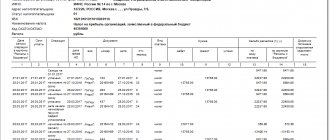On November 25, 2021, Federal Tax Service Order No. ED-7-14 dated August 31, 2020 came into force.[email protected] “On approval of forms and requirements for the execution of documents submitted to the registration authority during state registration of legal entities, individual entrepreneurs and peasant (farm) farms.” This order, as its name implies, introduced new forms for registering companies, peasant farms and individual entrepreneurs. The codes have changed in some places, remained the same in others, there is a small reference to previous forms.
What forms are approved by the Order:
- P11001 - initial registration of legal entities.
- P12003 - notification of the start of the reorganization procedure.
- P12016 - application for completion of the reorganization procedure,
- R13014 - application for registration of changes in the Unified State Register of Legal Entities or in the constituent documents.
- P15016 - application for liquidation of a legal entity. · R16002 - application for inclusion in the Unified State Register of Legal Entities on the termination of a unitary enterprise, state or municipal institution.
- P18002 - application for registration of an international company, international fund;
- P21001 - registration of individual entrepreneurs;
- P24001 - registration of changes about individual entrepreneurs in the Unified State Register of Individual Entrepreneurs;
- P26001 - registration of termination of the activities of an individual entrepreneur;
- P24002 - registration of changes about peasant farms
- P26002 - Registration of termination of the activities of peasant farms.
There is no form for the initial registration of peasant farms; for this, an application in form P11001 is now used.
When and by whom is form P38001 submitted to the Federal Tax Service?
Interested parties fill out this document if they have objections on the following subjects:
- changing the charter of a legal entity;
- upcoming exclusion from the Unified State Register of Legal Entities;
- entering other information into the Unified State Register of Legal Entities.
In accordance with paragraphs 1-2 of Art. 21.1 of the Law on State Registration No. 129-FZ dated 08.08.2001, the Federal Tax Service Inspectorate makes a decision to exclude a business entity from the register:
- if the organization has not provided reporting documentation to the Federal Tax Service over the past 12 months;
- During this period, there was no cash flow in at least one bank account of the legal entity.
Form P38001 is submitted by the interested individual, the head of the objecting company or a member of the legal entity. This can also be done by an individual who has been given a power of attorney to act on behalf of the company. It should be noted that if, within the allotted time, a reasoned objection to exclusion from the Unified State Register of Legal Entities is submitted to the tax authority along with the necessary package of documents, the decision to exclude the company from the register by the tax authorities will not be made (clause 4 of Article 21.1 of Law No. 129-FZ).
The business owner must submit a completed application form on form P38001 to the tax office within 3 months from the date of publication of information about the decision on the upcoming exclusion from the Unified State Register of Legal Entities (the period is counted from the date of publication in the media).
You can download form P38001 below.
What's with the standard charters?
In the new forms P11001 (during initial registration), P12016 (in section I part 1, in information about the legal entity created as a result of the reorganization), and in P13014 (when switching to a standard charter), you can select a standard charter for an LLC , as for the most frequently used organizational and legal form. Also, with form P13014, you can refuse to further use the standard charter.
There are 36 standard charters in total, among them there are, for example, the possibility of declaring all participants of an LLC as directors of the same LLC. Moreover, there is a separate charter where they act jointly, and there is another where they act independently of each other. It is not entirely clear why this is necessary at all, since according to statistics from the Federal Tax Service itself, the vast majority of LLCs have one participant, who is also its director.
However, there is now an opportunity to choose a standard charter.
Methods for submitting form P38001
An objection can be presented in several ways:
- Submission by the applicant in person to the territorial division of the Federal Tax Service. It is not necessary to have the document certified by a notary.
- Submitting form P38001 through a representative who must have a power of attorney to submit the document to the tax office. Form 38001 must be notarized.
- Send to the Federal Tax Service electronically via TKS. The document must be certified with digital signature.
- Send by mail. In this case, notarization is required.
How to send
There are several ways to submit a statement about false information:
- The simplest and most reliable way is to go to the tax office in person and hand over the form to a specialist from the local inspectorate.
- It is allowed to submit an application with the help of a representative, having previously issued a power of attorney for it from a notary.
- Another method is to send the document via regular mail, registered mail with return receipt requested, or via courier service.
- And finally, you can use electronic means of communication - this method of conveying the necessary information to supervisory services has become widespread only recently.
Important nuances of filling out form P38001
- The document can be filled out manually or generated using computer technology.
- Corrections are permitted, but only if they are properly certified. Next to the corrected data there must be the signature of the official and the seal of the company. The use of corrector is prohibited.
- In the document, you must fill out only those sheets for which the interested person has information. Blank pages do not need to be numbered or printed.
- On Form 38001, all text fields must be written in capital block letters.
- Instructions for completing the form are provided in the footnotes on each page of the form.
Next we will look at how to fill out form P38001.
Reasons for making changes to the register
Every organization, from time to time, goes through various transformations. They may be related to:
- expansion or change of activities;
- moving to a new place;
- “redistribution” of shares of company participants, etc.
All significant changes must be reflected in the constituent documents, which, in turn, are a source of information for the state register of legal entities.
Thus, information about significant changes occurring in the enterprise must be conveyed to supervisory structures. These important changes include:
- removal from office and subsequent appointment of a new director;
- change of LLC participants.
This data is also required to be contained in the state. register and all metamorphoses associated with these persons must be taken into account in it.
Any person can check how reliable the information about him is in the Unified State Register of Legal Entities and, if any inaccuracies are found, file an objection.
For this, legislators developed form P34001.
Who can submit an application on form P34001
Form P34001 is intended to be completed by individuals: directors or former directors, as well as participants or former participants of legal entities.
The nuance is that through it a person can convey information about the unreliability of information only about himself.
The exception is when the form is filled out by a citizen’s authorized representative, and then only on the condition that the principal’s representative has in his hands a power of attorney notarized according to all the rules.
Filling procedure
Filling out form P38001 begins with a title page, which consists of 5 points and answer options for them. Near each of them there is a special window, in which the applicant must indicate the corresponding number. It should be noted:
- subject of objection;
- what kind of information the filed objection concerns;
- in connection with which the objection was filed (with the presence of an objection or its withdrawal);
- against whom the objection is filed (a specific legal entity or an indefinite number of persons);
- who submits the document to the Federal Tax Service.
On sheet “A” you must indicate the OGRN and TIN encodings, as well as the full name of the organization in Russian, in respect of which changes are being made to the charter or Unified State Register of Legal Entities.
On sheet “B” you should display information about the documents, in connection with the provision of which an objection was submitted to the Federal Tax Service regarding changes to the charter or entering information into the Unified State Register of Legal Entities. Here we are talking about the date of submission of documents and their incoming number. If such documents are missing, the sheet is not filled out.
Sheet “B” contains information about the legal address, the inclusion of which in the Unified State Register of Legal Entities is being disputed. Here you need to display the following information: postal code, code of the subject of the Russian Federation, district, city, street, house or office number.
On sheet “D” you need to describe in detail the reasons for objections regarding information in the Unified State Register of Legal Entities, changes in the charter, etc. In the sample form P38001 you can see how to do this correctly.
Sheet “D” consists of four pages, which indicate information about the person who submitted form P38001. This may be an individual or an organization. Full name must be indicated on the last page. responsible person and must bear his signature.
Also on the last page of Form P38001, the method of notifying the applicant of the results of the consideration of the filed objection is indicated. Notice may be sent to the applicant:
- by email;
- by mail to the address indicated by the individual;
- by mail to the organization's address.
The sample below for filling out an objection on form P38001 can be taken as a basis. It will be useful to entrepreneurs and companies that are faced with the need to draw up this document for the first time.
I want to file/or withdraw P34001!
Form P34001 is a statement by an individual about the unreliability of information about him in the Unified State Register of Legal Entities. Its completion is required so that the existing inaccurate information in the register is corrected.
Anyone has the right to check the accuracy of the information in the register. Even the smallest mistake becomes a reason for objection. Form P34001 is filled out by legally capable individuals. These may be current or former managers of the company, members of legal entities.
Changes can only be made in person or after providing a notarized power of attorney. The correctness of filling out the document must be checked, the process is put under control, so an outsider cannot make changes to the register.
Where to apply
You need to submit the completed form P34001 to the territorial office of the tax service - at the place of registration of the legal entity, to the official portal of the tax service of the Russian Federation or to the State Services website.
What else do you need when applying?
Any documents submitted to government bodies, including applications and notifications, must be supported by something. In the case under consideration, since we are talking about an individual, it is necessary not only to submit copies of the constituent documents of the legal entity, but also copies of personal papers, first of all, a passport or other identification document (the one on the basis of which the data was entered into the application).
Terms of consideration
According to the Order, the Federal Tax Service reviews the document and provides the refusal material 10 days after its registration, or makes changes to the Unified State Register of Legal Entities a month later. This condition applies to any applications submitted in person, by a representative of the manager or by mail. If after this time no response has been received, the applicant should call the department or the tax service hotline. In the second case, clients are served and informed by telephone, without being sent to other specialists.
The filing of P34001 prevents an unscheduled inspection raid by the Federal Tax Service. Therefore, if the manager notices a typo, inaccuracy or unreliability of information in the Unified State Register of Legal Entities, you should not hesitate to submit an application. Taking timely measures will prevent problems in the future. The company's counterparties can report the unreliability of information to the Federal Tax Service, and then an unscheduled audit by the tax service cannot be avoided.
What should I do if they opened a company for me without my knowledge?
One of the most dangerous moments in terms of consequences is the discovery that fraudsters are registering a “fraudulent” company in the name of an unsuspecting person. They can pass prohibited goods through it, provide illegal criminal money, and the unsuspecting “director” becomes the responsible person before the Criminal Code. If you suddenly discover that, without my knowledge, some strangers have opened a company in my name, then the main thing is not to panic and entrust the matter to experienced lawyers.
Step-by-step instruction:
1. Submit an explanatory statement to the Federal Tax Service at your place of residence.
2. Come to a personal appointment for questioning under the protocol.
3. Fill out form P34001 about the unreliability of information in the Unified State Register of Legal Entities.
If everything is done correctly, then an entry will appear in the register that the legal entity has been excluded from the Unified State Register of Legal Entities. At the same time, you need to file a statement with the police that a company has been illegally registered in your name. As a rule, before such an incident, a passport disappears, so you should never be lazy and not write a statement about the theft of documents!
Grounds for excluding legal entities from the Unified State Register of Legal Entities
By virtue of paragraph 1 of Art. 64.2 of the Civil Code of the Russian Federation is considered to have actually ceased its activities and is subject to exclusion from the Unified State Register of Legal Entities in the manner established by the law on state registration of legal entities, a person who, within 12 months preceding his exclusion from the specified register:
- did not submit reporting documents required by tax legislation;
- did not carry out transactions on at least one bank account.
The same criteria for an inactive legal entity are named in paragraph 1 of Art. 21.1 of the Federal Law of 08.08.2001 No. 129-FZ “On state registration of legal entities and individual entrepreneurs” (hereinafter referred to as Law No. 129-FZ).
If both signs of an inactive legal entity are present simultaneously, the registration authority (IFTS) makes a decision on the upcoming exclusion of the legal entity from the Unified State Register of Legal Entities (clause 2 of Article 21.1 of Law No. 129-FZ). The procedure for making such a decision by the Federal Tax Service is determined by the norms of this article (but more on that a little later).
Important detail : the indicated decision is not made if there is information about the initiation of bankruptcy proceedings for a legal entity, as well as the procedures being carried out in relation to it, applied in a bankruptcy case.
Provided by Art. 21.1 of Law No. 129-FZ, the procedure for excluding a legal entity from the Unified State Register of Legal Entities also applies in the cases (clause 5):
a) the impossibility of liquidating a person due to the lack of funds for the expenses necessary for its liquidation and the impossibility of assigning these expenses to its founders (participants);
b) the presence in the Unified State Register of Legal Entities of information in respect of which an entry was made about their unreliability , for more than 6 months from the date of making such an entry.
Guarantees for interested parties
The exclusion of a legal entity from the Unified State Register of Legal Entities by decision of the Federal Tax Service is carried out taking into account the provisions provided for in clauses 3 and 4 of Art. 21.1 of Law No. 129-FZ guarantees aimed at protecting creditors and other persons whose rights and legitimate interests are affected by such an exception.
The essence of the guarantees provided for in paragraphs 3 and 4 of Art. 21.1 of Law No. 129-FZ is as follows.
1. The decision on the upcoming exclusion must be published in the journal “Bulletin of State Registration” within 3 days from the moment the Federal Tax Service Inspectorate makes such a decision.
Let us remind you: information contained in the Unified State Register of Legal Entities and intended for publication, as well as other information subject to publication in accordance with the legislation of the Russian Federation on state registration, in accordance with clause 1 of the Order of the Federal Tax Service of Russia dated June 16, 2006 No. SAE-3-09 / [email protected] must be published in the above-mentioned journal.
2. Simultaneously with the decision on the upcoming exclusion, information on the procedure and timing for sending applications to inactive legal entities, creditors or other persons whose rights and legitimate interests are affected in connection with the exclusion of an inactive person from the Unified State Register of Legal Entities must be published, indicating the address to which they can be sent statements.
Please note: In order to ensure that quickly receive information contained in the Unified State Register of Legal Entities (including information about the Federal Tax Service Inspectorate’s decision on the upcoming exclusion of a legal entity from the Unified State Register of Legal Entities, on the exclusion of a legal entity from the Unified State Register of Legal Entities), the Federal Tax Service in the interdepartmental electronic interaction system places a type of information that allows you to receive the above information. Also, the possibility of obtaining information from the Unified State Register of Legal Entities is provided through electronic services posted on the Federal Tax Service website. The legislation on state registration does not provide for any other interaction on issues related to the presence of signs of an inactive entity in a legal entity (Letter of the Federal Tax Service of Russia dated April 2, 2019 No. GD-18-14 / [email protected] ).
Thus, interested parties can track information regarding the upcoming exclusion of inactive (according to tax authorities) legal entities from the Unified State Register of Legal Entities in the journal “Bulletin of State Registration”, as well as by referring to the information contained in the Unified State Register of Legal Entities and submit objections regarding the upcoming exclusion.
The procedure for appealing the decision of the Federal Tax Service on the upcoming exclusion
Applications submitted by interested parties must be motivated and can be sent or submitted in the form approved by Order of the Federal Tax Service of Russia dated February 11, 2016 No. ММВ-7-14 / [email protected] , no later than 3 months from the date of publication (in journal "Bulletin of State Registration") decisions on the upcoming exclusion (clause 4 of Article 21.1 of Law No. 129-FZ).
Please note: In the Ruling of the Supreme Court of the Russian Federation dated February 12, 2019 No. 304-KG18-18451 in case No. A46-24009/2017, it is noted that the provisions provided for in paragraph 4 of Art. 21.1 of Law No. 129-FZ, the three-month period for sending an application is not preemptive.
These applications can be sent or submitted to the Federal Tax Service in the following ways (Clause 6, Article 9 of Law No. 129-FZ):
- in person (upon presentation of an identification document of the person filing the objection);
- through a representative of the legal entity (upon presentation of a notarized power of attorney or a copy thereof);
- by post (the authenticity of the signature of the interested individual or an authorized representative of the interested legal entity in this case must be notarized);
- in electronic form via TKS channels (in this case, the application must be signed using an electronic signature; if this is not done, the Federal Tax Service has the right to leave it without consideration - see Letter of the Federal Tax Service of Russia dated March 28, 2018 No. SA-4-9 / [email protected ] ).
If a reasoned objection is filed, a decision to exclude an inactive legal entity from the Unified State Register of Legal Entities is not made.
If within the 3-month period provided for in paragraph 4 of Art. 21.1 of Law No. 129-FZ, applications have not been sent, the Federal Tax Service excludes the inactive legal entity from the Unified State Register of Legal Entities by making an appropriate entry in it (clause 7 of Article 22 of Law No. 129-FZ).
Creditors or other persons whose rights and legitimate interests were affected in connection with the exclusion of a legal entity from the Unified State Register of Legal Entities may appeal the actions of the Federal Tax Service within a year from the day when they learned or should have learned about the violation of their rights (clause 8 of Article 22 of Law No. 129-FZ). Moreover, the mere appeal of interested parties to court within this period does not mean that the exclusion of a legal entity from the register will be considered unlawful.
Please note: the legal entity itself does not have the right to challenge exclusion from the Unified State Register of Legal Entities, since from the moment the entry on exclusion is made in the register, the legal capacity of the legal entity ceases (clause 3 of article 49 of the Civil Code of the Russian Federation, clause 3 of article 22 of Law No. 129-FZ). For the same reason, the head of a legal entity as an executive body does not have the right to apply to the court with claims against the Federal Tax Service. But if the director is also a participant in the legal entity, he has the right to file a claim as a founder whose interests were affected by the exclusion of the legal entity from the register.









